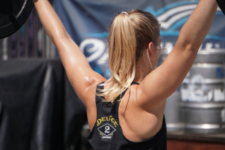
While if you’re a student, you aren’t necessarily responsible for understanding the science behind how effective strength and conditioning works but sometimes it helps. One of the most basic training principles to driving training adaptation, for example, is the idea of progressive overload. In order to build strength and endurance, we must expose the body to increasing demands, albeit load on the bar, distance run, or speed of movement.
Exposing the body to the same stimulus won’t drive adaptation. Period.
When your training is varied as much as it is in a GPP training program like ours, you’ll need to be attentive to driving progress. Be wary of missing the progressive overload principle by relying on the same scaling for your training. Eventually you’ll need to put a little more weight on the bar or toil on the pull up bar with less assistance in order to get better. Also, at some point, you’ll need to increase your weekly training volume. If you’ve been training two days a week for a few years, it’s time to find a third training day (and so on).
Logan Gelbrich
@functionalcoach
8/7/18 WOD
Complete the following for max reps:
Strict Pull-ups
then,
70%
50%
-Rest as needed-
Then, complete 4 rounds for time of:
8 Front Squats (155/105)
10 Deadlifts
35 Double Unders

